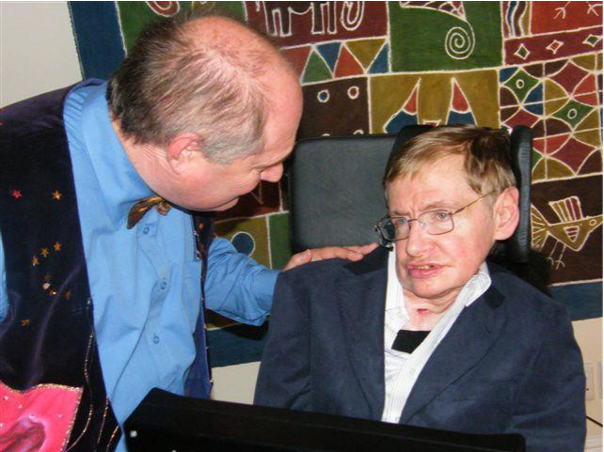My Visit with Professor Stephen Hawking
“I imagine what happens to human consciousness when we die is much like turning off a computer. I don’t believe in a heaven for computers. I think the afterlife is a fairy story for people afraid of the dark.”
Stephen Hawking
Earth is our home and its exquisite beauty amidst our vast, elegant universe has led people throughout history to contemplate the cosmos and our place in it. Some scientists have dedicated their lives and their research to understanding how the universe came about and what its future holds.
Thus, it has been a privilege for me as an international visiting research astronomer to work alongside some of the world’s top scientists who devote their time to such quests. In 2008, some of these eminent scientists descended on the seaside resort of Muizenberg, South Africa, to support an initiative to find an African Einstein. Albert Einstein is often regarded as one of the greatest scientists of all time—but could there be another such genius? If so, what wisdom would he or she offer to humanity?
A Gathering of Minds
These distinguished scientists chose to meet the public at the Muizenberg Pavilion near Cape Town. Among the stellar personalities in attendance was a former administrator of NASA, Michael Griffin. Next was Nobel Physics Laureate, David Gross, who revolutionized our understanding of atoms and their nuclei. Also in attendance was George Smoot, who won the Nobel Prize in physics for mapping the early universe in which galaxies later formed.
Thunderous applause then followed as the world’s best-known scientist of recent times, cosmologist Stephen Hawking, came onto the stage in his wheelchair. The audience in the pavilion was jam-packed (it seats only 800 people). The interest was so intense and the excitement so high that members of the public (and some scientists) actually stood outside and broke down a door in the Muizenberg Pavilion!
As most people know, Hawking had Lou Gehrig’s disease, which restricted him to communicate only by moving a cheek muscle that sent messages to a voice synthesizer connected to his computer. Using the synthesizer, Hawking then (very slowly) asked the Muizenberg audience three questions:
Question 1: Why are we here?
Question 2: Where do we come from?
Question 3: Where are we going?
Figure: The author (at left) gently touching the shoulder of Professor Stephen Hawking.
Photograph provided by David L. Block
Hawking’s Scientism
I live in South Africa and was privileged to spend a day in the presence of Stephen Hawking in Muizenberg (see figure), before I accompanied him to meet our former President, Nelson Mandela, in Houghton, South Africa. Here are my personal impressions.
Hawking was truly obsessed with a Creator God, though not in the positive sense at all. He dared to expunge God by bringing his (atheistic) philosophies into science—disguised under the mantle of science.
He was undoubtedly one of the greatest cosmologists of all time, and his triumph over disability was truly astonishing. But—and here lies an agenda which many members of the public may not know—Hawking was a leading light for scientism.
Scientism is an optimistic faith in the power of science alone to resolve the mysteries of the world, encapsulated in his fundamental three questions above.
Seeking a Balanced View of Science and Scripture
In earlier times, during the life of Galileo Galilei, the church and its cardinals ruled supreme and they misused the book of Scripture. They claimed that it asserted things about science that it did not, and they weren’t ready to accept experimental science. This view was clearly out of balance. Scripture is true in all that it claims, and when interpreted rightly, it harmonizes perfectly with the book of nature. The church had misunderstood this principle and used Scripture to silence science.
The situation today is equally out of balance, but to the other extreme. The scientific book of nature is paramount today, and some scientists would have us abandon the Scriptures as a source of truth about our world. The philosophical viewpoint of these “cardinals of scientism” is driven as much by the mood of the age and the personalities and beliefs of individuals as it is by scientific data and rigorous theory. Atheistic fundamentalism flourishes today, and its basic philosophical agenda avoids any need for a Creator.
Some of my scientific colleagues, evidently blind to scriptural revelation, consider theology as an inferior and worthless discipline, devoid of all truth. This is the ideology of scientism—a form of science that dismisses God as a fairy tale.
We now see two “cathedrals” before us; the traditional cathedral in which the Scriptures are expounded, and the new cathedral of scientism, wherein science is the bearer of all truth. In the traditional cathedral, the Scriptures tell us to take science seriously. In the new cathedral, scientism has no place for the Scriptures.
For the great scientist Blaise Pascal, Jesus, who grants us salvation, was the prize beyond all prizes. The cathedral of scientism never threatened his God-centered worldview. Such is not the case for contemporary scientists like Hawking.
Hawking believed that invoking “God” was historically necessary only to solve mysteries that science had not yet solved. The great inexorable advances of science have solved many of those mysteries and will continue to do so. Thus, as readers of his books will note: science has made God unnecessary. What need, then, for a Creator? Hawking asks. In his book The Grand Design (coauthored by Leonard Mlodinow), he explicitly stated:
“It is not necessary to invoke God to light the blue touch paper and set the universe going.”1
Such remarkable assertions attract worldwide media attention, as if by a magnet. A colleague and friend of mine, Lord Martin Rees (a former President of the Royal Society, who was a student at the University of Cambridge in the 1960s where Hawking was also enrolled), painted a moving and glowing tribute to Hawking upon his death in 2018, but Rees noted a crucial defect, too:
“He [Hawking] had robust common sense, and was ready to express forceful political opinions. However, a downside of his iconic status was that his comments attracted exaggerated attention even on topics where he had no special expertise—for instance philosophy.”2
As a Christian and a scientist, I distance myself from Hawking’s utilitarian understanding of God. Hawking’s “God” is always on the retreat in the face of new scientific discoveries. This “unnecessary God” does not interact with us or with our universe and its laws of nature. I believe otherwise. The incarnation is an act of divine grace. Salvation is an act of divine grace. To quote the literary giant G. K. Chesterton:
“Right in the middle of these things stands up an enormous exception. . . . It is nothing less than the loud assertion that this mysterious maker of the world has visited his world in person.”3
Although science can illuminate the glories of the creation, I believe that it is beyond the domain of science to infer that God does not exist.
The Self-Existent God
The God I am writing about is a personal God—the God-man, Jesus Christ, who is uncreated and who made the world.
Jesus is the Logos (word) who became incarnate (John chapter 1) and he exists outside space and time. Science does not have the weapons to expunge God or the revelation of his spiritual kingdom of grace. On the contrary, it everywhere reveals more and more of his handiwork.
Hawking asked the right questions, but his philosophical commitments led him to the wrong answers. My goal, and I hope yours, too, is to show how the wonders of our universe lead us naturally to the Creator and how we can come to know him.
Endnotes
- Stephen Hawking and Leonard Mlodinow, The Grand Design (New York: Bantam Books, 2012), 180.
- Lord Martin Rees, “Stephen Hawking: Martin Rees Looks Back on Colleague’s Spectacular Success against All Odds,” The Conversation, March 14, 2018.
- G. K. Chesterton, The Everlasting Man (New York: Image Books, 1955), 265–66.







